| Srl | Item |
| 1 |
ID:
151906
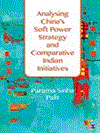

|
|
|
|
|
| Publication |
New Delhi, Sage Publications India Pvt Ltd, 2017.
|
| Description |
xxiv, 369p.; tables, abbre.hbk
|
| Standard Number |
9789386062659
|
|
|
|
|
|
|
|
|
|
|
|
Copies: C:1/I:0,R:0,Q:0
Circulation
| Accession# | Call# | Current Location | Status | Policy | Location |
| 058974 | 327.51/PAL 058974 | Main | On Shelf | General | |
|
|
|
|
| 2 |
ID:
092708
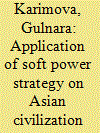

|
|
|
| 3 |
ID:
153544
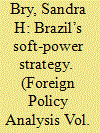

|
|
|
|
|
| Summary/Abstract |
By trading upon the principles of South-South cooperation, Brazil is widely viewed as having gained a positive image worldwide. Brazil’s South-South development cooperation was one of the foreign policy instruments it used to raise this profile. However, studies of the generation of soft power are still lacking in the international relations literature, and where empirical research exists it focuses more on the results of soft power strategies than on how soft power is created. Therefore, this article explores how Brazil’s soft power strategy is conceptualized in Brazil’s development cooperation discourse and how it is operationalized through South-South development activities. This research uses a triangulation method combining the analysis of official documents, academic studies and interviews to conclude that the Brazilian government under President Lula (2003-2011) influenced the organization of its cooperation agency and guided it towards sectors and targets that contribute to the creation of positive outcomes. This article contributes to the debate on the state’s behavior in soft power, that is, the ‘behavior’ of the Brazilian government in the design of its cooperation agency’s activities, thus also contributing to knowledge about the relationship between an agent’s behavior and the outcomes of a country’s policy of ‘soft empowerment’.
|
|
|
|
|
|
|
|
|
|
|
|
|
|
|
|
| 4 |
ID:
141373
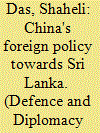

|
|
|
| 5 |
ID:
110283
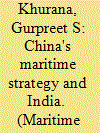

|
|
|
| 6 |
ID:
169129
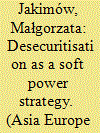

|
|
|
|
|
| Summary/Abstract |
While much discussion centres on economic properties and political challenges of implementing the China’s Belt and Road Initiative (BRI), few studies investigate the subtle connections between the narratives of the BRI and the political transformations in the regions en route of the project. Through a critique of the Copenhagen School’s theory of securitisation, this paper brings together the analysis of Chinese, Central-Eastern European (CEE) and the core EU governments’ ideas and perceptions of the BRI and assesses what they mean for the future of the European Union’s political and normative cohesion. This paper argues that the China-deployed desecuritised narratives of the BRI constitute an important soft power strategy of China in its engagement in Europe. The article illustrates how these desecuritised narratives are utilised and co-produced actively by countries of CEE with a political aim of negotiating their domestic interests with the EU’s institutions, making the process of desecuritisation neither apolitical nor benign. As China-promoted desecuritisation is used instrumentally by the regional actors to present China as an economic, political and normative alternative to the EU, the article contributes to the understanding of China’s desecuritisation as a soft power strategy, which is both forged through ‘negative’ language (Callahan, Politics 35(3–4):216–229, 2015) and is ‘contingent’ upon recipient audiences (Kavalski, Coop Confl 48(2):247–267, 2013). As a result, new regional dynamics emerge in the EU, which are driven by the populist turn and growing demand for Chinese investments in the European periphery, which China skilfully utilises through narratives of desecuritisation in order to boost its soft power strategy in the region.
|
|
|
|
|
|
|
|
|
|
|
|
|
|
|
|
| 7 |
ID:
162153
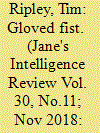

|
|
|